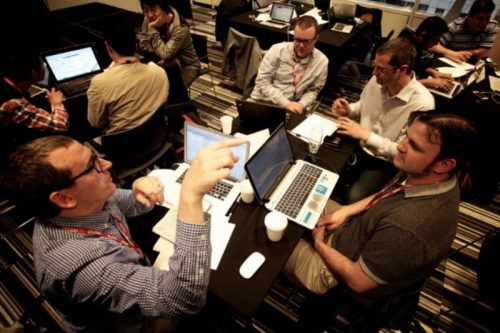“None of us is as smart as all of us”.
Ken Blanchard
One of our greatest moments at Teachlr has been winning the Talent and Innovation Competition of the Americas (TIC Americas). We accomplished this due to the hard work each member of our team invested.
It was no individual deed. While the management department defined the overall strategy, the design team created the platform and the tech guys developed it. The content within the platform was produced by the production and content departments, who also prepared the application to the TIC Americas. Then, at the competition, our directors marvelously presented the project to one of the most interesting audiences in the region.
This is just one example from our experience at Teachlr that shows why effective teams are indispensable to reach milestones.
We’ve been working together for some time now. This has allowed us to define what works for us (and what doesn’t). We’re happy to share our tips to build effective teams with you.
Commitment:
If every person strives to work hard, general results will be great. However, commitment precedes hard work. Team members must identify with the company’s mission to find meaning in their daily work. Each must make an effort to reach common objectives. Everyone must be motivated to become the best employee possible. When this happens, then work doesn’t really feel like work; personal and company goals intertwine.
Coordination:
Intention alone doesn’t get things done. Planning is essential to move forward. Effective teams take the time to organize joint activities and establish priorities. Our recommendations: Divide tasks, label them according to urgency, assign who’s in charge and set deadlines.
Interdepartmental communication:
Coordination in a team is achieved when there are effective communication channels. A team is a system in which each member is interdependent, so while every department has particular tasks, at some point they all converge. On Teachlr we all need to be on the same page and keep each other posted. To do so, we send a weekly short email, in which everyone summarizes their activities.
Productive meetings:
Effective teams call meetings only when necessary. Gathering a group without any point is a waste of time that affects productivity.
Still, meetings are useful for defining a collective roadmap and setting timetables. At Teachlr we also like to have brainstorming sessions, in which everyone pitches in. These are ideal to solve problems or when we need to come up with new ideas to innovate.
Respect:
Respect is the base of every relationship. The same principle applies in the workplace: People need to feel that their views, experience and knowledge are valuable. Each team member has skills that have qualified them for the job and as such, they are worthy of recognition and trust.
Of course, nobody’s perfect, everyone makes mistakes. However, when this happens, criticism should be constructive and not destructive. A positive approach shows respect for the person’s abilities. It’s also indicative of trust, that there’s room for improvement.
Teams are built by people of different backgrounds, religions and opinions who spend 40 hours a week together. They must work towards achieving common goals. They must coexist to advance and reach success.
Bottom line: The strength of a team relies on realizing that diversity enriches the unit.




